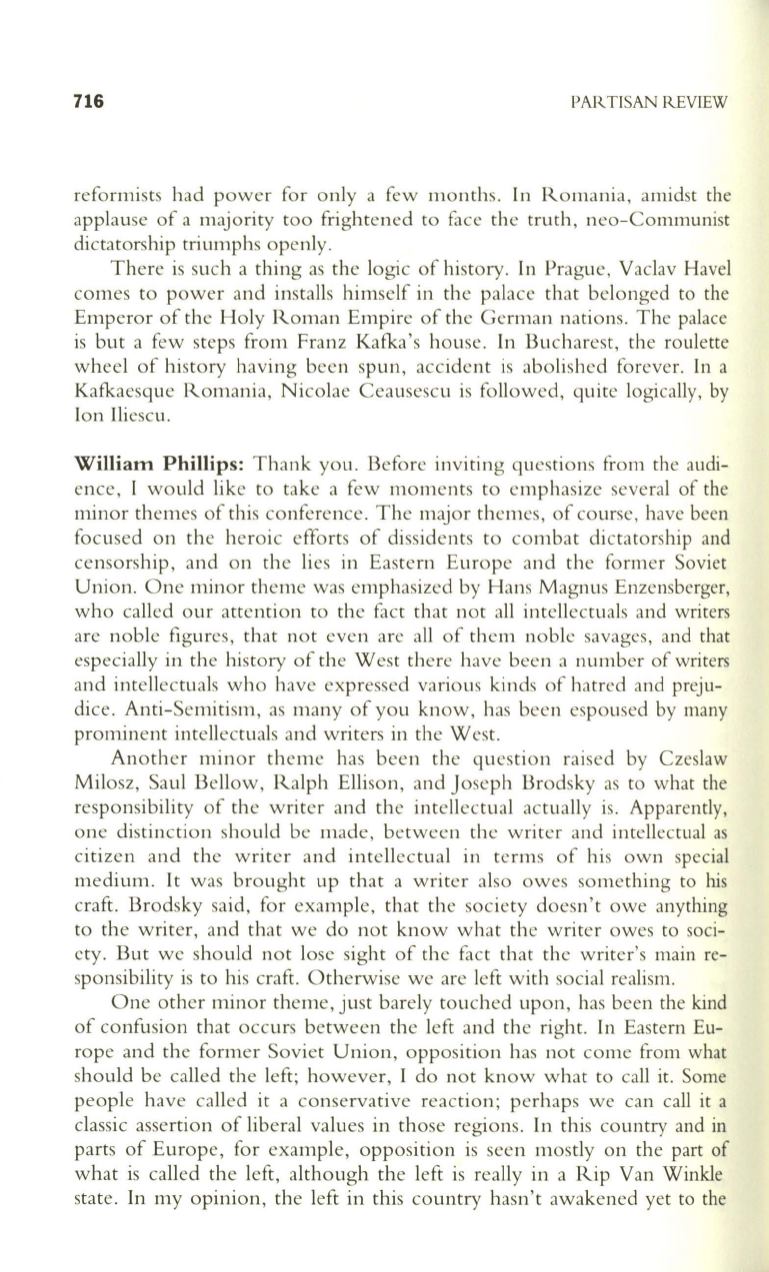
716
PARTISAN REVIEW
reformists had power for only a few months. In Romania, amidst the
applause of a majority too frightened to face the truth, neo-Communist
dictatorship triumphs openly.
There is such a thing as the logic of history. In Prague, Vaclav Havel
comes to power and installs himself in the palace that belonged
to
the
Emperor of the Holy Roman Empire of the German nations. The palace
is but a few steps from Franz Kafka's house. In Bucharest, the roulette
wheel of history having been spun, accident is abolished forever. In a
Kafkaesque Romania, Nicolae Ceausescu is followed, quite logically, by
Ion Iliescu.
William Phillips:
Thank you. Before inviting questions from the audi–
ence, I would like to take a few moments to emphasize several of the
minor themes of this conference. The major themes, of course, have been
focused on the heroic efforts of dissidents to combat dictatorship and
censorship, and on the lies in Eastern Europe and the former Soviet
Union. One minor theme was emphasized by Hans Magnus Enzensberger,
who called our attention to the fact that not all intellectuals and writers
are noble figures, that not even are all of them noble savages, and that
especially in the history of the West there have been a number of writers
and intellectuals who have expressed various kinds of hatred and preju–
dice. Anti-Semitism, as many of you know, has been espoused by many
prominent intellectuals and writers in the West.
Another minor theme has been the question raised by Czeslaw
Milosz, Saul Bellow, Ralph Ellison, and Joseph Brodsky as to what the
responsibility of the writer and the intellectual actually is. Apparently,
one distinction should be made, between the writer and intellectual as
citizen and the writer and intellectual in terms of his own special
medium. It was brought up that a writer also owes something to his
craft. Brodsky said, for example, that the society doesn't owe anything
to the writer, and that we do not know what the writer owes to soci–
ety. But we should not lose sight of the fact that the writer's main re–
sponsibility is to his craft. Otherwise we are left with social realism.
One other minor theme, just barely touched upon, has been the kind
of confusion that occurs between the left and the right. In Eastern Eu–
rope and the former Soviet Union, opposition has not come from what
should be called the left; however, I do not know what to call it. Some
people have called it a conservative reaction; perhaps we can call it a
classic assertion of liberal values in those regions. In this country and in
parts of Europe, for example, opposition is seen mostly on the part of
what is called the left, although the left is really in a Rip Van Winkle
state. In my opinion, the left in this country hasn't awakened yet to the


